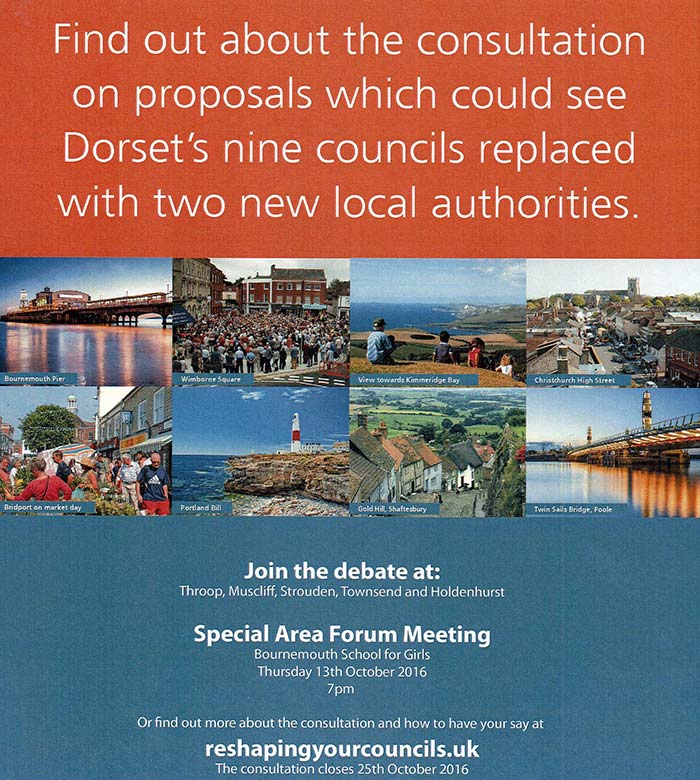Special Area Forum Meeting
Thursday, 13th October 2016 - 7 p.m. to 9 p.m.
at Performing Arts Centre, Bournemouth School for Girls, Castle Lane West.

Throop, Muscliff, Strouden, Townsend and Holdenhurst (TMSTH) Area Forum Special Meeting, Thursday 13 October 2016, at Bournemouth School for Girls, where residents joined in the debate on the future of Dorset's Councils, the speakers being Mr. Bill Cotton, Executive Director, Bournemouth Borough Council, and Lisa Stuchberry, Consultation and Market Research Manager, Bournemouth Borough Council, who noted the following in response to questions by residents and Councillors, regarding the options as set out on a card provided to the meeting which noted:
Amalgamation options:
"Councils are considering reducing the number of Dorset local authorities from nine to two." Options for consideration being:
1 Retaining all nine councils; 2a Large Conurbation - Bournemouth, Christchurch, East Dorset and Poole; 2b Medium Conurbation - Bournemouth, Christchurch and Poole; 2c Small Conurbation - Bournemouth and Poole.
Questions and responses:
1. There will not be a referendum on the proposals, nine leaders of the various Councils will decide;
2. However, each Council will have the opportunity to scrutinise the process;
3. It is better to have a planned process than staff losing their jobs in a piecemeal fashion because of inevitable cuts in Council grants, planned change may help people manage redundancies;
4. The views of the unions will also be heard;
5. Although the large Conurbation option was favoured, this may not be good for rural areas;
6. Agreement should be through discussion, but there is an option to overrule a 'lower-tier' local authority which stymies the process.
7. The process is driven by the need for change. The money coming from central government is falling and financial savings have to be made, particularly in order to protect the most vulnerable e.g. those in need of social care.
8. Dorset is a positive example of such change taking place; some other areas have seen fractious debate. Some other positive examples are Cornwall County Council and 9 district councils; Wiltshire.
9. Current contracts for the provision of council services will need to be reviewed.
10. As regards any weakening of local democracy and possible reduction in service provision, the reduction in number of local councillors will represent a reasonable trade-off between having too many and too few. Given the financial situation, there is no alternative, since no change equals continued decline.
11. The role of civic society, through volunteers, for example is very important. Local authorities want to encourage the population to get more involved.
12. As far as new local authorities' ability to balance their budgets is concerned, none will be 'stand-alone'.
13. It probably makes sense to keep urban areas under one authority and rural under another.
14. Three reports - finance, consultative and business case - will be used to make the decision.
15. The amalgamation process will see an estimated one-off cost of £25m to cover, for example, IT changeover, new logos etc. The reports are being written by independent consultants in order to ensure objectivity and have been contracted through the Local Government Association and HMT. The money spent now will save money in the future.
Audience comments:
Cllr Adams: Some areas have prospered through strategic alliances rather than through merging (something that does not necessarily require redundancies). Such alliances help to increase purchasing power.
Cllr Weinhönig: Bournemouth BC undertook a review of service provision in 2007. Since 2011, Bmth has been cooperating with Poole and Christchurch Councils e.g. adult care, learning and the spur road.
Answer: There is already a great deal of joint working e.g. to influence central government about roads. The amalgamation would put this on a more formal basis.
Cllr Rey: Would like to allay fears as to the consequence for democracy of reducing councillor numbers. Bournemouth benefited from the 1997 change to a unitary authority that took back powers from Dorset County Council and reduced councillor numbers. A further reduction will make representatives work harder. Some councils don’t want change, but I hope that it will take place and seamlessly.